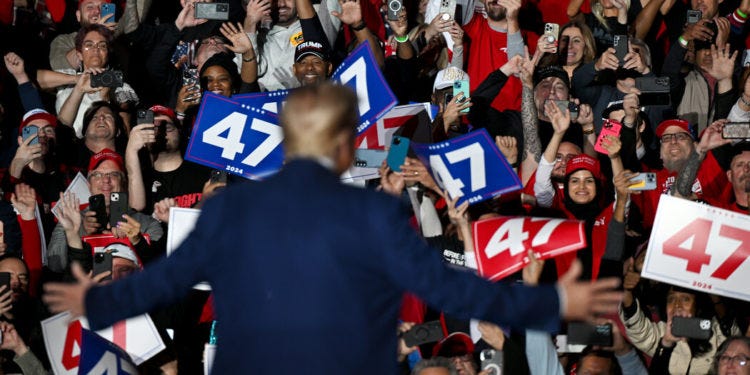Trump Is Running His Transition Team on Secret Money
President-elect Donald J. Trump is keeping secret the names of the donors who are funding his transition effort
Etienne Note: This article also appears in “Government”, Media and Academia Criminality Exposed, A digest of HUNDREDS and HUNDREDS of articles exposing and suggesting inter-generational organized crime's control of the "Government," Media and Academia by the Art of Liberty Foundation. You can view the other articles or subscribe on Telegram: https://t.me/Government_Scams
President-elect Donald J. Trump is keeping secret the names of the donors who are funding his transition effort, a break from tradition that could make it impossible to see what interest groups, businesses or wealthy people are helping launch his second term.
Mr. Trump has so far declined to sign an agreement with the Biden administration that imposes strict limits on that fund-raising in exchange for up to $7.2 million in federal funds earmarked for the transition. By dodging the agreement, Mr. Trump can raise unlimited amounts of money from unknown donors to pay for the staff, travel and office space involved in preparing to take over the government.
Mr. Trump is the first president-elect to sidestep the restrictions, provoking alarm among ethics experts.
Those seeking to curry favor with the incoming administration now have the opportunity to donate directly to the winning candidate without their names or potential conflicts ever entering the public sphere. And unlike with campaign contributions, foreign nationals are allowed to donate to the transition.
“When the money isn’t disclosed, it’s not clear how much everybody is giving, who is giving it and what they are getting in return for their donations,” said Heath Brown, a professor of public policy at John Jay College of Criminal Justice who studies presidential transitions. “It’s an area where the vast majority of Americans would agree that they want to know who is paying that bill.”
Mr. Trump’s transition team, led by Linda McMahon and Howard Lutnick, both of whom were nominated to cabinet positions last week, has repeatedly said it intends to sign the agreements with the Biden administration, known as memorandums of understanding.
But it blew past deadlines to do so in September and October, and nothing has indicated progress being made to that end in the two weeks since the election. The White House, which is obliged to offer the agreements to presidential candidates under a federal law known as the Presidential Transition Act, has said it is ready to assist the Trump transition to ensure a smooth handover of power.
On Thursday, Senator Elizabeth Warren, Democrat of Massachusetts, sent a letter to the Biden administration, raising concerns that the Trump transition’s failure to sign the agreements was “uncharted territory” that “threatens the American public.” She asked for an accounting of how the administration was engaging with the Trump transition on the agreements.
“The Trump-Vance transition lawyers continue to constructively engage with the Biden-Harris administration lawyers regarding all agreements contemplated by the Presidential Transition Act,” Brian Hughes, a Trump transition spokesman, said in a statement responding to queries about the status of negotiations with the Biden administration.
Transition efforts help the president-elect with the complex task of taking over the federal government, including selecting thousands of potential political appointees. Previous transitions, including Mr. Trump’s before his first term, have signed the agreements.
Mr. Trump’s transition team, formally known as Trump Vance 2025 Transition Inc., has revealed nothing about how much money it hopes to raise, who has contributed to the fund or how it is spending the money.
The current Trump transition, like its predecessors, is set up as a “dark money” nonprofit. Those groups typically do not have to disclose their donors, even to the Internal Revenue Service. But unlike Mr. Trump’s team this year, earlier transitions accepted financial support from the General Services Administration, which oversees much of the transition process. In exchange for that federal money, they agreed to conditions that other dark-money nonprofits do not have to follow, like capping individual contributions at $5,000 and disclosing the names of their donors.
When Barack Obama won the presidency in 2008, his transition raised $4.5 million while restricting donations to a maximum of $5,000, and pledging to refuse money from corporations, labor unions, political action committees, lobbyists and registered foreign agents. Nearly 60,000 people contributed, with an average donation of about $75.
In 2020, the Biden transition set a fund-raising goal of $7 million and brought in seasoned Democratic fund-raisers to help. But when the General Services Administration, spurred on by Mr. Trump’s false claims that he had won the election, withheld government funding for weeks, private donations flooded in.
By the time of the inauguration, Mr. Biden’s team had raised more than $22 million, with 450 employees on its books. Its disclosure report, released in February 2021, was over 1,000 pages.
Before the 2016 election, Mr. Trump relied on former Gov. Chris Christie, Republican of New Jersey, to run his transition. But, as the journalist Bob Woodward later reported, when Mr. Trump discovered that Mr. Christie had been raising money to pay for that venture, Mr. Trump accused him of “stealing” from his campaign and “jinxing” his chances.
Mr. Trump fired Mr. Christie immediately after the election, replacing him with his running mate, Mike Pence.
The 2016 Trump transition, which did sign the agreement with the General Services Administration, had roughly 120 employees and ultimately disclosed raising $6.5 million and receiving $2.4 million in federal reimbursements. Mr. Trump used office space in Trump Tower to interview candidates during the transition, and filings show that his transition spent $258,000 on “rent and utilities,” though not who was paid.
In 2018, that transition donated $150,000 in leftover money to another dark-money nonprofit, the 45 Alliance, which was meant to help Mr. Trump’s appointees and reportedly held a reception for them at what was then Mr. Trump’s hotel in Washington.
The 2016 transition also paid some $1.8 million in legal fees, much of which was spent after Mr. Trump had been sworn in as president. In late 2017, for example, the transition challenged the government’s decision to hand over its emails to Robert Mueller, who was then the special counsel, during his investigation of Mr. Trump’s ties to Russia. The group also fought legal battles with New Jersey’s attorney general, which sued it for failing to register properly as a nonprofit with the state.
That transition was eventually wound down and, as required by its settlement with New Jersey, donated the last of its funds to a charity, according to Kory Langhofer, a lawyer for the 2016 transition. The transition chose the Wounded Warrior Project, a nonprofit that helps veterans. That charity said it had received $17,478.
Leading up to this year’s election, Mr. Trump’s campaign and groups supporting it raised more than $1 billion, according to federal records, including more than $100 million apiece from three billionaires: Timothy Mellon, Elon Musk and Miriam Adelson.
But opportunities to curry favor with large contributions do not end on Election Day. A traditional post-campaign target has been the presidential inaugural committee, which, as an entity separate from both the campaign and the transition, raises money to fund the parties held to celebrate the handover of power.
In 2016, Mr. Trump raised $107 million for his inaugural, including from 30 donations of $1 million each. The attorney general of the District of Columbia later sued, accusing the inaugural committee of misusing funds, including by overpaying for space at Mr. Trump’s Washington hotel. The suit was settled for $750,000.
As with campaign donations, contributions to inaugural funds are regulated by the Federal Election Commission, which requires the inaugural committee to file detailed lists of donors. It also prohibits donations from foreign nationals.
Transition funding is not regulated by the F.E.C. And I.R.S. rules permit the nonprofits in question to accept donations from foreigners without public disclosure.
Max Stier, the president of the Partnership for Public Service, which studies transition operations, said disclosure rules were intended to keep donors from using the transition fund to seek favorable treatment privately from the incoming administration before it even begins.
“The transition government is a little like setting up the universe, pre-Big Bang,” Mr. Stier said. “It’s a lot of influence.”
The Trump transition was registered in Florida in August by Jacob Roth, a lawyer for the Dhillon Law Group, a prominent Republican firm. This month, Mr. Roth also registered Mr. Trump’s inaugural fund in Florida, and the inauguration group began seeking individual donations, from $50,000 to $1 million, a fund-raising flier reviewed by The New York Times shows.
Mr. Roth did not respond to a request for comment.
Because the transition has also failed to sign a separate agreement with the Justice Department, the Federal Bureau of Investigation has been unable to conduct background checks needed to grant appointees security clearance. As a result, the transition is reportedly using private firms to vet candidates, leaving open the possibility that federal law enforcement may never properly review Trump appointees.
The Trump transition has also left unsigned a memorandum of understanding with the White House that outlines how appointees and other staff members can gain physical access to federal agencies and classified information before Inauguration Day on Jan. 20. That agreement is contingent on the transition submitting and posting publicly an ethics plan that complies with federal law, including an explicit statement about Mr. Trump’s own plans to avoid potential conflicts of interest. It has so far not done so.
Experts on presidential transitions say lawmakers did not appear to have anticipated that a presidential candidate would decline millions of dollars from the federal government or refuse to post an ethics code.
In theory, the I.R.S. could audit the Trump transition and ask it to provide information on its contributors, but even if it did, the agency would not make those names public.
Brian Galle, a Georgetown University law professor who studies nonprofits, said he was skeptical the I.R.S. would conduct an audit.
“Given the political sensitivity of this organization,” Mr. Galle said, “I’d say the odds of their being audited are zero.”
The post Trump Is Running His Transition Team on Secret Money appeared first on New York Times.
Go paid at the $5 a month level, and we will send you both the PDF and e-Pub versions of “Government” - The Biggest Scam in History… Exposed! and a coupon code for 10% off anything in the Government-Scam.com/Store.
Go paid at the $50 a year level, and we will send you a free paperback edition of Etienne’s book “Government” - The Biggest Scam in History… Exposed! OR a 64GB Liberator flash drive if you live in the US. If you are international, we will give you a $10 credit towards shipping if you agree to pay the remainder.
Support us at the $250 Founding Member Level and get a signed high-resolution hardcover of “Government” + Liberator flash drive + Larken Rose’s The Most Dangerous Superstition + Art of Liberty Foundation Stickers delivered anywhere in the world. Our only option for signed copies besides catching Etienne @ an event.







2020 election was rigged. Not a false claim!
Can't blame Trump at all.